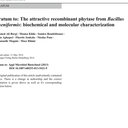Siropins, novel serine protease inhibitors from gut microbiota acting on human proteases involved in inflammatory bowel diseases.
Ключови думи
Резюме
BACKGROUND
In eukaryotes, the serpins constitute a wide family of protease inhibitors regulating many physiological pathways. Many reports stressed the key role of serpins in several human physiopathologies including mainly the inflammatory bowel diseases. In this context, eukaryotic serpins were largely studied and their use to limit inflammation was reported. In comparison to that, bacterial serpins and mainly those from human gut microbiota remain poorly studied.
RESULTS
The two genes encoding for putative serpins from the human gut bacterium Eubacterium sireaum, display low sequence identities. These genes were overexpressed and the encoded proteins, named Siropins, were purified. Activity studies demonstrated that both purified proteins inhibited serine proteases but surprisingly they preferentially inhibited two human serine proteases (Human Neutrophil Elastase and Proteinase3). The biochemical characterization of these Siropins revealed that Siropin 1 was the most active and stable at low pH values while Siropin 2 was more thermoactive and thermostable. Kinetic analysis allowed the determination of the stoichiometry of inhibition (SI) which was around 1 and of the association rate constants of 7.7 × 104 for the Human Neutrophil Elastase and 2.6 × 105 for the Proteinase3. Moreover, both Siropins displayed the ability to inhibit proteases usually present in fecal waters. Altogether our data indicate the high efficiency of Siropins and their probable involvement in the control of the overall intestine protease activity.
CONCLUSIONS
Here we report the purification and the biochemical characterization of two novel serpins originated from Eubacterium sireaum, a human gastro-intestinal tract commensal bacteria. These proteins that we called Siropins, efficiently inhibited two human proteases reported to be associated with inflammatory bowel diseases. The determination of the biochemical properties of these enzymes revealed different temperature and pH behaviours that may reflect adaptation of this human commensal bacterium to different ecological environments. To the best of our knowledge, it is the first bacterial serpins showing an attractive inhibition of fecal proteases recovered from a mice group with chemically induced inflammation. Altogether our data highlight the interesting potential of Siropins, and serpins from the human gut microbiota in general, to be used as new alternative to face inflammatory diseases.


